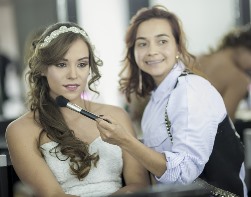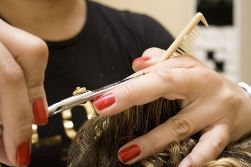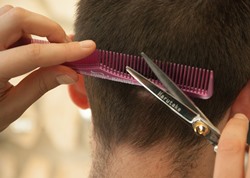How to Choose the Right Cosmetology Academy near Crucible Pennsylvania
 Since you have decided to train as a cosmetologist and enroll in a beauty school near Crucible PA, the process begins to search for and enroll in the ideal school. It’s imperative that the program you choose not only provides the proper instruction for the specialty you have chosen, but also preps you for passing the licensing exam. When you begin your initial search, you may be rather confused about the difference between beauty schools and cosmetology schools. Well don’t be, because the names are basically interchangeable and both refer to the same kind of school. We’ll talk a little bit more concerning that in the next section. If you anticipate commuting to classes you will need to find a school that is within driving distance of your Crucible home. Tuition will also be a critical consideration when assessing potential schools. Just bear in mind that because a school is the nearest or the cheapest it’s not automatically the ideal choice. There are a number of other factors that you should evaluate when comparing schools, for instance their reputation and accreditation. We will examine what questions you should ask about the cosmetology schools you are considering later in this article. Before we do, let’s discuss a bit about what cosmetology is, and what types of training programs are offered.
Since you have decided to train as a cosmetologist and enroll in a beauty school near Crucible PA, the process begins to search for and enroll in the ideal school. It’s imperative that the program you choose not only provides the proper instruction for the specialty you have chosen, but also preps you for passing the licensing exam. When you begin your initial search, you may be rather confused about the difference between beauty schools and cosmetology schools. Well don’t be, because the names are basically interchangeable and both refer to the same kind of school. We’ll talk a little bit more concerning that in the next section. If you anticipate commuting to classes you will need to find a school that is within driving distance of your Crucible home. Tuition will also be a critical consideration when assessing potential schools. Just bear in mind that because a school is the nearest or the cheapest it’s not automatically the ideal choice. There are a number of other factors that you should evaluate when comparing schools, for instance their reputation and accreditation. We will examine what questions you should ask about the cosmetology schools you are considering later in this article. Before we do, let’s discuss a bit about what cosmetology is, and what types of training programs are offered.
Defining Cosmetology
 Cosmetology is a profession that is everything about making the human body look more attractive through the application of cosmetics. So naturally it makes sense that a number of cosmetology schools are regarded as beauty schools. Many of us think of makeup when we hear the word cosmetics, but really a cosmetic may be anything that improves the appearance of a person’s skin, hair or nails. In order to work as a cosmetologist, almost all states require that you go through some kind of specialized training and then be licensed. Once you are licensed, the work settings include not only Crucible PA beauty salons and barber shops, but also such places as spas, hotels and resorts. Many cosmetologists, once they have gained experience and a customer base, launch their own shops or salons. Others will begin seeing customers either in their own residences or will go to the client’s house, or both. Cosmetology college graduates have many names and work in a wide range of specializations including:
Cosmetology is a profession that is everything about making the human body look more attractive through the application of cosmetics. So naturally it makes sense that a number of cosmetology schools are regarded as beauty schools. Many of us think of makeup when we hear the word cosmetics, but really a cosmetic may be anything that improves the appearance of a person’s skin, hair or nails. In order to work as a cosmetologist, almost all states require that you go through some kind of specialized training and then be licensed. Once you are licensed, the work settings include not only Crucible PA beauty salons and barber shops, but also such places as spas, hotels and resorts. Many cosmetologists, once they have gained experience and a customer base, launch their own shops or salons. Others will begin seeing customers either in their own residences or will go to the client’s house, or both. Cosmetology college graduates have many names and work in a wide range of specializations including:
- Hairdressers
- Hairstylists
- Beauticians
- Barbers
- Manicurists
- Nail Technicians
- Makeup Artists
- Hair Coloring Specialists
- Estheticians
- Electrolysis Technicians
As formerly stated, in the majority of states practicing cosmetologists have to be licensed. In some states there is an exception. Only those conducting more skilled services, such as hairstylists, are required to be licensed. Other people working in cosmetology and less skilled, which include shampooers, are not required to be licensed in those states.
Cosmetology Certificates and Degrees
 There are primarily two avenues offered to get cosmetology training and a credential upon completion. You can enroll in a certificate (or diploma) course, or you can pursue an Associate’s degree. Certificate programs usually require 12 to 18 months to complete, while an Associate’s degree usually takes about 2 years. If you enroll in a certificate program you will be instructed in each of the major areas of cosmetology. Shorter programs are offered if you prefer to concentrate on just one area, for example hair coloring. A degree program will also most likely incorporate management and marketing training so that graduates are better prepared to run a parlor or other Crucible PA business. Higher degrees are not prevalent, but Bachelor and Master’s degree programs are offered in such areas as salon or spa management. Whichever type of program you decide on, it’s imperative to make certain that it’s certified by the Pennsylvania Board of Cosmetology. A number of states only approve schools that are accredited by certain respected organizations, for example the American Association of Cosmetology Schools (AACS). We will discuss the advantages of accreditation for the school you select in the next section.
There are primarily two avenues offered to get cosmetology training and a credential upon completion. You can enroll in a certificate (or diploma) course, or you can pursue an Associate’s degree. Certificate programs usually require 12 to 18 months to complete, while an Associate’s degree usually takes about 2 years. If you enroll in a certificate program you will be instructed in each of the major areas of cosmetology. Shorter programs are offered if you prefer to concentrate on just one area, for example hair coloring. A degree program will also most likely incorporate management and marketing training so that graduates are better prepared to run a parlor or other Crucible PA business. Higher degrees are not prevalent, but Bachelor and Master’s degree programs are offered in such areas as salon or spa management. Whichever type of program you decide on, it’s imperative to make certain that it’s certified by the Pennsylvania Board of Cosmetology. A number of states only approve schools that are accredited by certain respected organizations, for example the American Association of Cosmetology Schools (AACS). We will discuss the advantages of accreditation for the school you select in the next section.
Online Beauty Programs
 Online beauty classes are accommodating for Crucible PA students who are working full time and have family responsibilities that make it challenging to attend a more traditional school. There are a large number of online cosmetology school programs offered that can be attended via a personal computer or laptop at the student’s convenience. More traditional beauty programs are typically fast paced because many programs are as short as six or eight months. This means that a significant portion of time is spent in the classroom. With online courses, you are covering the same volume of material, but you are not devoting numerous hours away from your home or driving back and forth from classes. However, it’s essential that the school you choose can provide internship training in local salons and parlors so that you also receive the hands-on training needed for a complete education. Without the internship part of the training, it’s difficult to acquire the skills necessary to work in any facet of the cosmetology field. So make sure if you choose to enroll in an online program to verify that internship training is available in your area.
Online beauty classes are accommodating for Crucible PA students who are working full time and have family responsibilities that make it challenging to attend a more traditional school. There are a large number of online cosmetology school programs offered that can be attended via a personal computer or laptop at the student’s convenience. More traditional beauty programs are typically fast paced because many programs are as short as six or eight months. This means that a significant portion of time is spent in the classroom. With online courses, you are covering the same volume of material, but you are not devoting numerous hours away from your home or driving back and forth from classes. However, it’s essential that the school you choose can provide internship training in local salons and parlors so that you also receive the hands-on training needed for a complete education. Without the internship part of the training, it’s difficult to acquire the skills necessary to work in any facet of the cosmetology field. So make sure if you choose to enroll in an online program to verify that internship training is available in your area.
Questions to Ask Cosmetology Programs
 Below is a list of questions that you should look into for any beauty training school you are contemplating. As we have previously discussed, the location of the school relative to your Crucible PA residence, as well as the price of tuition, will undoubtedly be your primary qualifiers. Whether you wish to earn a certificate, diploma or a degree will no doubt be next on your list. But once you have reduced your school options based on those initial qualifications, there are additional factors that you need to research and take into consideration before enrolling in a cosmetology program. Following we have collected some of those additional questions that you should ask every school before making a final selection.
Below is a list of questions that you should look into for any beauty training school you are contemplating. As we have previously discussed, the location of the school relative to your Crucible PA residence, as well as the price of tuition, will undoubtedly be your primary qualifiers. Whether you wish to earn a certificate, diploma or a degree will no doubt be next on your list. But once you have reduced your school options based on those initial qualifications, there are additional factors that you need to research and take into consideration before enrolling in a cosmetology program. Following we have collected some of those additional questions that you should ask every school before making a final selection.
Is the Program Accredited? It’s essential to make certain that the cosmetology training program you pick is accredited. The accreditation should be by a U.S. Department of Education recognized local or national organization, such as the National Accrediting Commission for Cosmetology Arts & Sciences (NACCAS). Programs accredited by the NACCAS must meet their high standards ensuring a superior curriculum and education. Accreditation can also be essential for obtaining student loans or financial aid, which often are not available in 15325 for non- accredited schools. It’s also a requirement for licensing in several states that the training be accredited. And as a final benefit, numerous Crucible PA businesses will not hire recent graduates of non-accredited schools, or might look more positively upon individuals with accredited training.
Does the School have an Excellent Reputation? Each beauty college that you are seriously evaluating should have a good to exceptional reputation within the industry. Being accredited is an excellent starting point. Next, ask the schools for references from their network of businesses where they have referred their students. Verify that the schools have high job placement rates, indicating that their students are highly demanded. Check rating companies for reviews along with the school’s accrediting organizations. If you have any contacts with Crucible PA salon owners or managers, or any person working in the business, ask them if they are familiar with the schools you are considering. They might even be able to propose others that you had not looked into. Finally, contact the Pennsylvania school licensing authority to see if there have been any grievances filed or if the schools are in full compliance.
What’s the School’s Specialty? Some beauty schools offer programs that are broad in nature, focusing on all areas of cosmetology. Others are more focused, offering training in a specific specialty, for example hairstyling, manicuring or electrolysis. Schools that offer degree programs often expand into a management and marketing curriculum. So it’s important that you enroll in a school that specializes in your area of interest. If your objective is to be trained as an esthetician, make certain that the school you enroll in is accredited and well regarded for that program. If your desire is to start a hair salon in Crucible PA, then you need to enroll in a degree program that will teach you how to be an owner/operator. Selecting a highly regarded school with a poor program in the specialty you are pursuing will not deliver the training you require.
Is Enough Hands-On Training Provided? Practicing and refining cosmetology techniques and abilities demands lots of practice on volunteers. Find out how much live, hands-on training is provided in the beauty classes you will be attending. Some schools have salons on site that allow students to practice their growing talents on real people. If a beauty program furnishes minimal or no scheduled live training, but rather depends predominantly on utilizing mannequins, it might not be the best option for acquiring your skills. Therefore try to find other schools that provide this kind of training.
Does the School Provide Job Assistance? Once a student graduates from a cosmetology program, it’s important that he or she receives assistance in finding that initial job. Job placement programs are an important part of that process. Schools that offer assistance maintain relationships with Crucible PA employers that are looking for skilled graduates available for hiring. Verify that the programs you are looking at have job placement programs and inquire which salons and businesses they refer students to. Additionally, ask what their job placement rates are. High rates not only affirm that they have broad networks of employers, but that their programs are highly regarded as well.
Is Financial Aid Offered? Many cosmetology schools provide financial aid or student loan assistance for their students. Check if the schools you are looking at have a financial aid office. Consult with a counselor and identify what student loans or grants you may qualify for. If the school belongs to the American Association of Cosmetology Schools (AACS), it will have scholarships offered to students as well. If a school satisfies each of your other qualifications except for cost, do not drop it as an alternative before you learn what financial assistance may be available.
Considering Cosmetology Schools in Crucible PA?
If you are considering attending Beauty School in Crucible PA or in a nearby area, following is some interesting and useful information regarding the location of your new school campus.
Crucible steel
Crucible steel is steel made by melting pig iron (cast iron), iron, and sometimes steel, often along with sand, glass, ashes, and other fluxes, in a crucible. In ancient times steel and iron were impossible to melt using charcoal or coal fires, which could not produce temperatures high enough. However, pig iron, having a higher carbon content thus a lower melting point, could be melted, and by soaking wrought iron or steel in the liquid pig-iron for long periods of time, the carbon content of the pig iron could be reduced as it slowly diffused into the iron. Crucible steel of this type was produced in South and Central Asia during the medieval era. This generally produced a very hard steel, but also a composite steel that was inhomogeneous, consisting of a very high-carbon steel (formerly the pig-iron) and a lower-carbon steel (formerly the wrought iron). This often resulted in an intricate pattern when the steel was forged, filed or polished, with possibly the most well-known examples coming from the wootz steel used in Damascus swords. Due to the use of fluxes the steel was often much higher in quality (lacking impurities) and in carbon content compared to other methods of steel production of the time.
Techniques for production of high quality steel were developed by Benjamin Huntsman in England in the 18th century. Huntsman used coke rather than coal or charcoal, achieving temperatures high enough to melt steel and dissolve iron. Huntsman's process differed from some of the wootz processes in that it took a longer time to melt the steel and to cool it down and allowed more time for the diffusion of carbon.[1] Huntsman's process used iron and steel as raw materials, in the form of blister steel, rather than direct conversion from cast iron as in puddling or the later Bessemer process. The ability to fully melt the steel removed any inhomogeneities in the steel, allowing the carbon to dissolve evenly into the liquid steel and negating the prior need for extensive blacksmithing in an attempt to achieve the same result. Similarly, it allowed steel to simply be poured into molds, or cast, for the first time. The homogeneous crystal structure of this cast steel improved its strength and hardness compared to preceding forms of steel. The use of fluxes allowed nearly complete extraction of impurities from the liquid, which could then simply float to the top for removal. This produced the first steel of modern quality, providing a means of efficiently changing excess wrought iron into useful steel. Huntsman's process greatly increased the European output of quality steel suitable for use in items like knives, tools, and machinery, helping to pave the way for the Industrial revolution.
Iron alloys are most broadly divided by their carbon content: cast iron has 2-4% carbon impurities; wrought iron oxidizes away most of its carbon, to less than 0.1%. The much more valuable steel has a delicately intermediate carbon fraction, and its material properties range according to the carbon percentage: high carbon steel is stronger but more brittle than low carbon steel. Crucible steel sequesters the raw input materials from the heat source, allowing precise control of carburization (raising) or oxidation (lowering carbon content). Fluxes, such as limestone, could be added to the crucible to remove or promote sulfur, silicon, and other impurities, further altering its material qualities.
How to Choose a Beauty College Crucible PA
 Selecting and enrolling in the ideal cosmetology school is essential to get the appropriate training to become a licensed cosmetology practitioner. You originally came to this website because you have an interest in learning more about How to Choose a Beauty College. So make sure to ask all the questions that you need to in order to feel confident about your decision. Make sure to compile all of the information you receive from the cosmetology school admissions departments, prioritize what matters the most to you, and then utilize that data to contrast schools. A good start in your due diligence process is to make certain that the academy and program you pick are accredited and have excellent reputations within the profession. If you begin with that base, and answer the additional questions supplied in this post, you will be able to narrow down your list of schools so that you can make the right choice. Once you graduate and pass your licensing test, you will be self-assured that you are qualified to start your new career as a professional cosmetologist in Crucible PA.
Selecting and enrolling in the ideal cosmetology school is essential to get the appropriate training to become a licensed cosmetology practitioner. You originally came to this website because you have an interest in learning more about How to Choose a Beauty College. So make sure to ask all the questions that you need to in order to feel confident about your decision. Make sure to compile all of the information you receive from the cosmetology school admissions departments, prioritize what matters the most to you, and then utilize that data to contrast schools. A good start in your due diligence process is to make certain that the academy and program you pick are accredited and have excellent reputations within the profession. If you begin with that base, and answer the additional questions supplied in this post, you will be able to narrow down your list of schools so that you can make the right choice. Once you graduate and pass your licensing test, you will be self-assured that you are qualified to start your new career as a professional cosmetologist in Crucible PA.
More Beautiful Locations in Pennsylvania
